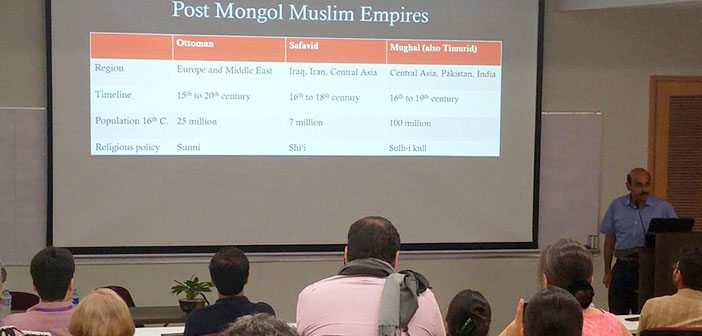The Interdisciplinary Development Research and Action Center (IDRAC) hosted its inaugural event on 11th August, 2016. The lecture titled ‘Sovereignty and Sainthood: The Politics of Saint Shrines in the Mughal, Safavid, and Ottoman Empires’ was delivered by Dr. Azfar Moin – Assistant Professor of Religious Studies who received a Ph.D. in History from the University of Michigan-Ann Arbor and taught South Asian history at Southern Methodist University prior to joining UT-Austin.
Dr. Azfar delivered his lecture at the Tariq Rafi Hall at Habib University in front of a diverse audience comprising of intellectuals, academics, students, and people who were genuinely interested in the subject.
The core emphasis of the talk revolved around a comparative analysis of how three major Muslim Empires namely the Safavids, Ottomans, and the Mughals perceived Saint Shrines in a post Mongol era. Dr. Azfar made a point that the Muslim world went through a paradigm shift in the immediate aftermath of the Mongol invasion which saw a total loss of confidence in the office of the Caliph. Both the Safavids and the Mughals – who shared a common Persianite court culture – needed a source of legitimization for their throne. In the absence of a legitimate (and effective) Caliphate, the Muslim Empires looked towards their patron saints to derive sovereignty for their thrones.
As an example, the Safavids raised two imperial shrines dedicated to their patron saints in Ardabil and Mashhad while Herat was claimed from the Naqshbandi Sufis where they erected similar shrines to legitimize their claims. It is argued that Akbar modeled the city of Ajmer Sharif around the Safavid model cities of Mashhad and Ardabil and dedicated it to Muinuddin Chishti from whom he derived spiritual sovereignty. Contrary to the Mughals and the Safavids, the Ottomans were less sympathetic to the shrines and their adherents so much so that Sultan Mehmed II (d. 1481) imposed strong central control and stripped the shrines of their endowments. This latter decision was overturned partially by Bayezid II (d. 1512) who reversed these policies and reprivatized the shrines to regain favor with the shrine’s adherents.
The talk was followed by a brief panel discussion in which Dr. Azfar sat with HU faculty member Dr. Hasan Ali Khan. In the end, Dr. Hafeez Jamali, the host concluded the inaugural event of IDRAC by thanking the audience members along with our esteemed guest with a promise that IDRAC will continue to showcase such research and findings by imminent scholars – both regional and international – to better understand comparative history which will aid both scholars and students alike.




